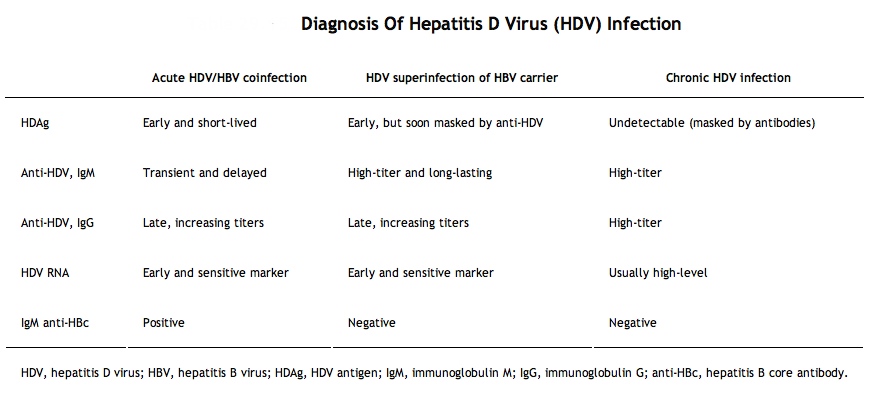Diagnosis
Hepatitis Delta virus infection should be considered in individuals who are HBV seropositive or have been recently infected with HBV. The following laboratory tests may be used for diagnostic purposes:
-Identification of delta antigen or antibodies (IgG or IgM anti-HDV) with ELISA or radioimmunoassay (RIA)
-Detection of HDV genome and quantification of viral load in infected serum with RT-PCR
-Immunohistochemical nalysis of liver tissue in individuals with persistent HDV infection
Acute HDV-HBV co-infection
-Presence of HBsAg, HBeAg, and HBV DNA in serum during incubation
-Anti-HDV antibodies develop late in acute infection and are not detectable after infection
-Appearance of IgM anti-HD, HDV RNA, and HDAg in serum
-IgM and IgG disappear within months of recovery
HBV-HDV Super infection
-HDV viremia in serum in pre-acute phase that persists and is associated with active liver disease
-High titers of IgM and IgG anti-HDV in serum during acute phase and detectable indefinitely
-Levels of HBsAg decline when HDAg appear in serum
-Presence of HDAg and HDV RNA in serum and liver persists

FIGURE from Schiff's Diseases of the Liver, p. 787.
Differential Diagnosis
Clinical hepatitis caused by HDV infection can be difficult to distinguish from other causes of hepatitis. A differential diagnosis may include include infectious and non-infectious causes.
Viral causes:
-Hepatitis A virus
-Hepatitis B virus
-Hepatitis C virus
-Hepatitis E virus
-Hepatitis G virus
-Ctytomegalovirus
-Epstein-Barr virus
-Yellow Fever
Infectious Causes:
-Toxoplasmosis
-Leptospirosis
-Brucellosis
Non-infectious Causes:
-Alcoholic hepatitis
-Liver abcess
-Biliary obstruction
-Drug-induced hepatitis
-Autoimmune hepatitis
-Acute cholelithiasis/cholecystitis
-Severe, acute congestive heart failure
-Metastatic cancer to the liver
-Hepatic vein thrombosis (Budd-Chiari Syndrome)